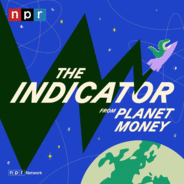Top Trump advisers have been boasting about 'awesome' trade deals the administration is negotiating with other countries. But are these deals real? Today on the show, we ask a former U.S. trade negotiator whether these agreements hold up. Related episodes: Dealmaker Don v. Tariff Man Trump (Apple / Spotify) Why there's no referee for the trade war (Apple / Spotify) Is this a bank? For sponsor-free episodes of The Indicator from Planet Money, subscribe to Planet Money+ via Apple Podcasts or at plus.npr.org. Fact-checking by Sierra Juarez. Music by Drop Electric. Find us: TikTok, Instagram, Facebook, Newsletter. Learn more about sponsor message choices: podcastchoices.com/adchoicesNPR Privacy Policy

Wirtschaft
The Indicator from Planet Money Folgen
A bite-sized show about big ideas. From the people who make Planet Money, The Indicator helps you make sense of what's happening in today's economy. It's a quick hit of insight into money, work, and business. Monday through Friday, in 10 minutes or less.
Folgen von The Indicator from Planet Money
300 Folgen
-
Folge vom 29.05.2025Are Trump's trade deals the real deal?
-
Folge vom 28.05.2025Why are college coaches paid so much?If you had to guess, would you say the president of a university usually makes more money than the football coach? Well, you may be wrong. A college's football coach is often their highest paid employee. The University of Alabama pays its football coach on average close to $11 million. Today on the show, why are college football coaches paid so much? Do their salaries really make economic sense? Related episodes:Why the Olympics cost so much (Apple / Spotify)Want to get ahead in youth sports? Try staying back a year (Apple / Spotify)For sponsor-free episodes of The Indicator from Planet Money, subscribe to Planet Money+ via Apple Podcasts or at plus.npr.org.Fact-checking by Sierra Juarez. Music by Drop Electric. Find us: TikTok, Instagram, Facebook, Newsletter. Learn more about sponsor message choices: podcastchoices.com/adchoicesNPR Privacy Policy
-
Folge vom 27.05.2025How to build abundantlyWhy is building affordable housing so hard these days? We talk to author Derek Thompson about his new book with Ezra Klein, Abundance, about what they believe is keeping affordable housing out of reach in high-income cities. Related: How big is the US housing shortage? (Apple / Spotify) How California's speed rail was always going to blow out (Apple / Spotify) Why building public transit costs so much For sponsor-free episodes of The Indicator from Planet Money, subscribe to Planet Money+ via Apple Podcasts or at plus.npr.org. Fact-checking by Sierra Juarez. Music by Drop Electric. Find us: TikTok, Instagram, Facebook, Newsletter. Learn more about sponsor message choices: podcastchoices.com/adchoicesNPR Privacy Policy
-
Folge vom 26.05.2025The dawn of search enginesToday on the show, we bring you a special episode from the Understood feed at CBC podcasts. It's an excerpt from a series called Who Broke the Internet hosted by Cory Doctorow. The four part series details his criticisms on the state of the modern internet and what we can do about it. From his conversations with Eric Corly the publisher of 2600, an iconic hacker magazine, best known under his hacker name Emmanuel Goldstein, to Clive Thompson a tech and culture writer to Steven Levy the author of "In the Plex: How Google Thinks, Works, and Shapes our Lives" this excerpt digs into how search engines started.You can listen to more of the podcast here.Related episodes:The hack that almost broke the internet (Apple / Spotify)For sponsor-free episodes of The Indicator from Planet Money, subscribe to Planet Money+ via Apple Podcasts or at plus.npr.org.Music by Drop Electric. Find us: TikTok, Instagram, Facebook, Newsletter. Learn more about sponsor message choices: podcastchoices.com/adchoicesNPR Privacy Policy
